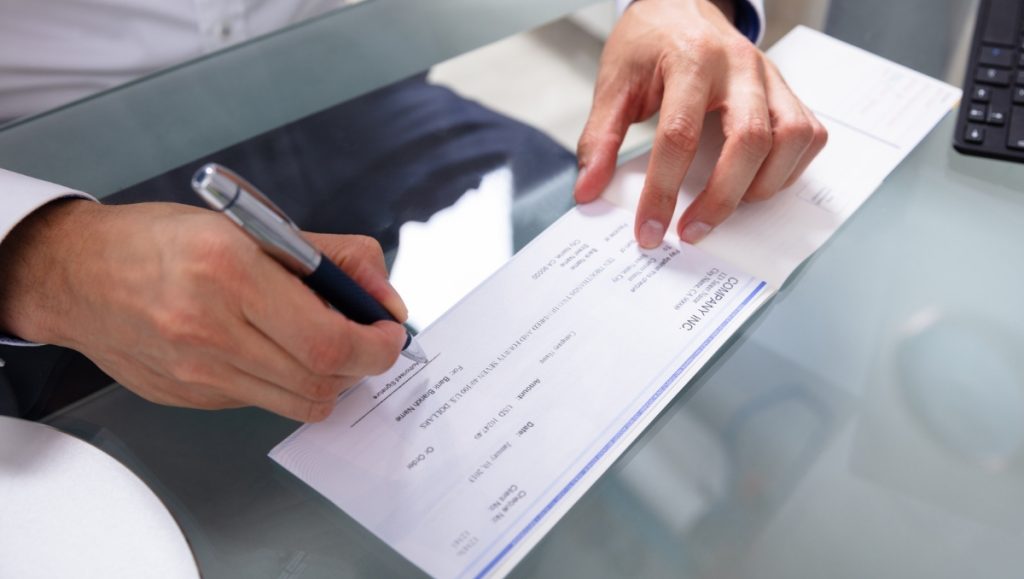This post contains affiliate links. See the affiliate disclaimer here.
Are you wondering if a cheque can expire? It’s a common question, especially when life gets busy and important tasks slip our minds. Well, the answer is yes, a cheque can indeed expire.
But what does that mean for you? In this article, we’ll explore the details of cheque expiration, including the time frame for cashing a cheque, the possibility of extending the validity period, and what to do if you find yourself with an expired cheque.
So, if you’ve ever found an old cheque lying around or received one that’s past its prime, keep reading to find out what your options are.

What is cheque expiration?
When it comes to cheques, it’s important to be aware of their expiration date. Cheque expiration refers to the point at which a cheque becomes invalid and cannot be cashed. This means that if you have a cheque that has passed its expiration date, you will no longer be able to successfully cash it.
Typically, cheques have a validity period of six months from the date they were issued. This means that you have six months to cash a cheque before it expires. For example, if a cheque was issued on the 1st of May 2023, you’ll have until the 1st of November 2023 to cash it before it becomes invalid.
It’s important to note that the duration for a cheque’s validity can be printed on the cheque itself. The account holder can instruct the bank to shorten or lengthen the cheque’s expiry date. However, this is at the discretion of the account holder and may not always be possible.
To determine whether a cheque has expired, simply look at the date written on it. If six months or more have passed since that date, then the cheque has likely expired. It’s always a good idea to cash a cheque as soon as possible to avoid any complications that may arise from an expired cheque.
Should you find yourself with an expired cheque, obtaining a new cheque is often the best solution. You can reach out to the issuer of the cheque and request that they write you a new one. However, there may be certain scenarios, such as the cheque issuer passing away or refusing to repay, where this may not be possible.
In the next section, we will explore what options are available to you if you have an expired cheque and are unable to obtain a new one.
Time frame for cashing a cheque
When it comes to cashing a cheque, there is typically a time frame within which you need to do so before the cheque expires. Cheques usually have a validity period of six months from the date they were issued. For example, if a cheque was issued on the 1st of May 2017, you’ll have until the 1st of November 2017 to cash it before it expires.
However, it’s important to note that account holders have the option to instruct the bank to shorten or lengthen the cheque’s expiry period. The actual duration for a cheque’s validity can also be printed on the cheque itself, at the discretion of the account holder.
It’s essential to cash your cheque within the validity period to avoid any complications that may arise from an expired cheque. Once a cheque expires, you will not be able to successfully cash it.
In some cases, the validity period can be much shorter. Large cheques, such as payroll contributions or major reimbursements, may have a validity period of sixty days. The decision on whether to honor a stale personal cheque is usually at the bank’s discretion, particularly for personal cheques.
Another type of cheque that often causes confusion is a postdated cheque. These cheques have a future date written on them and are primarily used for making deposits at a later date. The cheque cannot be honored by the bank before the date mentioned on it.
Remember, if you don’t cash a cheque or deposit it within six months after your endorsement, there is a possibility that the bank may still process the payment. However, unless you hear otherwise, it’s best to consider the money gone. The time frame for cashing a cheque can vary depending on the type of cheque and the bank involved.
Can the validity period be extended?
Sometimes, you may find yourself in a situation where the validity period of a cheque is about to expire, and you still need to cash it. In such cases, you may wonder if there is any way to extend the validity period of the cheque. Let’s explore this further.
Can you extend the validity period of a cheque?
While the validity period of a cheque is typically set at six months from the date it was issued, it’s important to note that this time frame can be subject to change. In some cases, you may be able to request an extension on the validity period of a cheque, but it ultimately depends on the policies of the bank and the agreement made with the account holder.
What should you do if you need to extend the validity period?
If you find yourself in a situation where you need to extend the validity period of a cheque, it’s recommended that you reach out to the bank where the cheque was issued or the account holder who issued the cheque. They will be able to provide you with guidance on the options available to extend the validity period, if any.
However, it’s important to keep in mind that extending the validity period is not always possible. Banks have their own policies and guidelines, and they may have restrictions on the extension of cheque validity periods. It’s best to inquire about this as early as possible to avoid any potential complications or delays.
Remember, the key takeaway here is that while there may be circumstances where the validity period of a cheque can be extended, it ultimately depends on the bank’s policies and the agreement made with the account holder. It’s always best to reach out to the relevant parties for guidance and clarification.
What to do with an expired cheque
Here’s what you need to know if you find yourself with an expired cheque:
Contact the Cheque Issuer
The first step you should take when dealing with an expired cheque is to reach out to the person or business that issued it. Communicate your situation and explain that the cheque has expired. In many cases, they may simply issue you a new cheque without any hassle.
Consider Legal Remedies
If the cheque issuer refuses to reissue a new cheque or if they are unable to do so, you may have to explore legal remedies. Consult with a lawyer to understand your options and the best course of action. They will help you navigate through the legal process and advise you on any further steps you can take.
Make a Written Request
If you are encountering difficulties in getting a new cheque from the issuer, you could consider sending them a written request explaining the situation in detail. State the reasons why you are requesting a new cheque and provide any supporting evidence, such as copies of the expired cheque. This formal request may help to encourage the issuer to take action.
Contact Your Bank
Another option is to contact your bank to discuss the situation. Explain that you have an expired cheque and inquire if they have any procedures in place to handle such cases. Some banks may be able to assist you by providing guidance or suggesting alternative solutions.
Remember, while these steps may help you in resolving the issue of an expired cheque, it’s always best to act promptly. The longer you wait to address the problem, the more difficult it may become to find a resolution. Keep in mind that every situation is unique, and the approach you take will depend on various factors such as the reason for the expired cheque and the willingness of the issuer to cooperate.
Conclusion
If you find yourself with an expired cheque, it’s important to take immediate action. Start by reaching out to the person or business that issued the cheque and explain the situation. They may be willing to issue you a new cheque without any hassle.
However, if they refuse or are unable to do so, it may be necessary to explore legal remedies and consult with a lawyer. Additionally, consider sending a written request to the issuer and contacting your bank for guidance.
Remember, time is of the essence, so act promptly and consider the unique factors of your situation. By taking these steps, you can increase your chances of resolving the issue and obtaining the funds you are owed.
Frequently Asked Questions
Can I cash a check from 10 years ago?
Generally, a bank will not cash a ‘stale’ check. Contact the issuer of the check and ask them to write you a new one. They will likely ask you to return the ten-year-old one.
Do checks expire if not cashed?
In summary, banks are legally obligated to honor a personal check for up to six months. If you find an expired check, you may want to contact whoever issued it before attempting to cash it.
Does the date on a check matter?
A signed check immediately becomes legal tender that a bank can deposit or cash before the indicated date on the check. Therefore, a bank will be able to accept a check if it is dated and signed.
Does a company have to reissue an expired check?
The employer must verify that the check was never cashed, but once that is done, the employer must reissue a check.
Is it illegal to change the date on a check?
Changing the date on a check is considered check fraud and is illegal.

